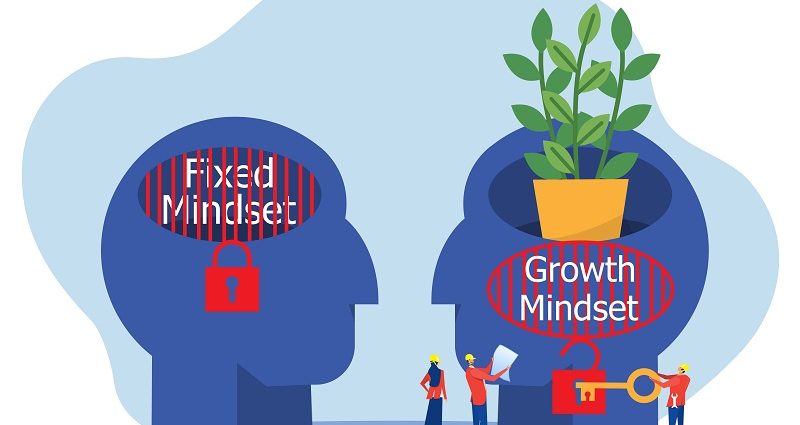Share this
What is Growth Mindset?
Before diving into the importance of growth mindset for your child, let’s first understand what it is. Coined by psychologist Dr. Carol Dweck, the term “growth mindset” refers to the belief that intelligence and abilities can be developed and improved over time through hard work, effort, and the right learning strategies. In other words, a growth mindset is the opposite of a fixed mindset, where individuals believe that their talents and intelligence are predetermined and cannot be changed.
How Does Growth Mindset Impact Learning and Development?

With a growth mindset, children and adults alike are more likely to embrace challenges, persist in the face of setbacks, and see effort as the path to mastery. This mindset has been linked to higher levels of achievement, less stress, and less tendency for aggression, proving to be an essential factor in a child’s learning and development journey. One study found that a growth mindset can lead to greater classroom motivation and higher grades. In this study, a group of junior high school students were shown in a series of presentations that intelligence is not fixed and can be improved. After the presentations, these students showed increase in intrinsic motivation and better academic performance than students who were shown something unrelated.
4 Reasons Why Growth Mindset Is Crucial for Your Child

The importance of cultivating a growth mindset in children has become increasingly evident in recent years. Here are four key reasons why every parent should focus on fostering a growth mindset in their children:
1. Improved Motivation and Engagement
Kids with a growth mindset are more likely to feel motivated and engaged in their studies since they believe their efforts will lead to improvements. This motivation can have a snowball effect, as students who are engaged in their education often experience more success, leading to an increased desire to learn and grow. As described above, studies have found that students who underwent a growth mindset intervention were more motivated, leading to higher grades and increased persistence in school.
2. Greater Resilience and Perseverance
Children with a growth mindset are more likely to have resilience when faced with challenges, as they see setbacks as opportunities to learn and grow rather than a reason to give up. This increased resilience can be crucial in overcoming obstacles that children may face in school and life. Combined with supportive environment, growth mindset can promote perseverance which ultimately increases academic performance.
3. Enhanced Problem-Solving Skills
Embracing a growth mindset encourages children to explore multiple approaches to solving problems. Instead of becoming stuck in one way of thinking or giving up when they find something difficult, children with a growth mindset will experiment with different strategies and techniques, fostering creative problem-solving skills. These skills are not only crucial for academic success but can also be an invaluable asset in navigating the challenges of the real world.
4. Better Mental Health and Well-being
Children with a growth mindset are likely to have increased self-esteem and better mental health, as they are less prone to negative self-evaluations and more accepting of their mistakes. They understand that setbacks are a natural part of learning and growth, removing the pressure to be perfect all the time. A study showed that a growth mindset intervention reduced stress and aggressive behavior in high school students, demonstrating the impact of the mindset on a child’s overall well-being.
How Can Parents Encourage a Growth Mindset in Their Children?

Now that you’ve grasped the importance of a growth mindset for your child, you may be wondering what you can do as a parent to nurture this mindset. Here are a few strategies to help your child develop a growth mindset:
- Praise effort and process over outcome: Instead of focusing on your child’s results, praise their efforts, strategies, and hard work, as this will emphasize the importance of growth and learning rather than the need to succeed at all costs. When your child shows you a high test score, don’t praise by saying “Oh, you are very smart!” This will encourage fixed-mindset as your child will believe that being smart is a fixed quality that someone innately possesses. This can lead to your child wanting to choose easier tasks over more difficult tasks just to prove that he or she is smart. Instead, acknowledge that your child has put in hard work by saying, “You’ve really put in a lot of time in preparing for the test. You deserve it!”
- Model a growth mindset: Demonstrate the value of learning from mistakes and setbacks by sharing your own experiences and struggles, and teach your child that it’s okay to not be perfect all the time. Tell your child that failing is a natural part of learning, and if you never fail, that means you’ve never taken on a challenge.
- Encourage goal setting and reflection: Help your child set achievable goals, track their progress, and regularly reflect on their learning journey. This will help them see how far they’ve come and instill tangible benchmarks for future growth.
- Provide opportunities for challenges and learning: Expose your child to new experiences that may be challenging and promote the idea that learning and growth can be achieved through trying new things and pushing their boundaries. What’s important is to be daring enough to take on a challenge instead of being afraid of it. If your child has decided to do something new, comment and praise on the progress that he or she is making instead of just demanding to see the result.
Conclusion
In conclusion, fostering a growth mindset in your child can have a profound impact on their learning, achievement, and overall well-being. By understanding the power of a growth mindset and taking active steps to encourage this way of thinking, you are giving your child the tools they need to navigate the challenges of school and life with greater resilience, motivation, and success.
Richard Zhang, M.Ed., is an educator and a software developer with a Masters degree in education from University of Toronto and an immense passion for education and learning. Until the pandemic, Richard owned an award-winning learning centre in Toronto. For 15 years, he has taught and mentored hundreds of elementary, middle school, and high school students succeed in academics. He is also an app developer specializing in web and mobile application in educational and business sectors.






1 Comment
Comments are closed.